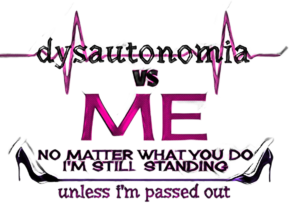Vagus Nerve Damage & Dysautonomia
My gastroenterologist, Dr. S, believes vagus nerve damage could be a contributing factor of my autonomic difficulties. If that’s true then it could be “driving” the dysautonomia.
A definition is in required: Va – gus is the Latin word for wanderer.
Here’s my laywoman’s understanding of the Wanderer: CN X, the 10th Cranial Nerve, is “the body’s superhighway,” providing data from the brain to other organs. It signals to & from the different organs it touches via the Central Nervous System. Regulating bodily reactions during restful periods CN X deals primarily with the involuntary Parasympathetic Nervous System. However, the vagus nerve does have some communication with the Sympathetic Nervous System. Because it has both sensory & motor duties it is considered a “mixed” nerve. To read the complete anatomical course taken by the Vagus nerve click here.
VAGUS NERVE EXPEDITION
Why don’t we lay people wander along briefly with the 10th & longest of the 12 cranial nerves from genesis to terminus:
- Welcome to the brainstem where our Wanderer Tour begins!
- Watch your step as we exit the cranium with two other nerves, numbers IX & XI.
- Notice the path as we head down to the neck & throat area, where CN X performs many intricate functions before branching left & right.
- Take care as we enter the thorax, where even more complex tasks are carried out with the esophagus & the heart.
- Things will get tight for a moment as we make our way into the abdomen through a tiny aperture in the diaphragm known as the hiatus.
- Our journey comes to an end in the abdomen where CN X’s root branches break up into other branches that supply data to the esophagus, stomach, small and large bowel.
- We hope you have enjoyed this Tour of the Wanderer!
SYMPTOMS OF VAGUS NERVE DAMAGE
If the wandering vagus nerve is ever damaged in, say, a car accident, you may pay a systemic price. Seconds after my accident in 1997 my voice changed. Forever. First it became weak sounding. Soon I couldn’t sing anymore. I remember my accountant told me I sounded “sad.” It’s 24 years now & my voice has never regained its former tone.
It’s clear the throat itself has been affected. For the last few years I’ve been choking for no good reason. Believe it or not the toughest thing to swallow is water & my own saliva! Sometimes the opening to the throat will close just as liquid hits & it gets thrown back up into my mouth causing me to gag & spit. Other times the water seems to get “stuck” and I start coughing. Last month there was an incident during which I coughed non-stop for five hours.
The next day Dr. S informed me I had experienced a throat spasm & should have put a medication he had previously prescribed for me (Hyoscyamine) under my tongue. I didn’t think of doing that because I didn’t know I was having a throat spasm. And I’ve only used the drug for esophageal spasms. Now I know it can be used for this too. Hoping I won’t ever need it again.
[WARNING! NOT ADVISING ANYONE ELSE ON EARTH TO TAKE THIS OR ANY OTHER DRUG! SPEAK TO YOUR DOCTOR BEFORE TAKING ANY MEDICATION!]

I wonder if the choking thing could be from borderline Chiari 1 Malformation. Regarding that “diagnosis,” my extremely accomplished always-keeping-up-with-the-latest-medical-news neurologist & the thoroughly experienced radiologist who read the MRI say I do not have Chiari and am not borderline.
The prominent Chiari surgeon I went to said it wasn’t clear that I have it or that I am borderline but he wanted more testing, which I didn’t get done.
The only one who’s positive I have it is the back surgeon who had to operate on me a second time to repair a spinal fluid leak from the first surgery he had done the previous month. Thin dura & other odd symptoms of mine are what led him to suspect Chiari. Part of his time as a resident was spent working in the Chiari Institute. I got my appointment at the Institute because of the surgeon’s clout there.
Getting back to Dr. S. He was the first person & doctor to ever mention the word dysautonomia to me back in 1999. He suspected I had it & he was proved correct. After the car accident my GI system stopped operating correctly. I could barely eat a thing, dropped to 90 lbs & nearly died from malnutrition. (I wasn’t seeing Dr. S at that time or he certainly would have helped me. I was busy going from doctor to doctor to doctor, none of whom helped in any way.) Since 2019 I’ve been in a serious dysautonomia relapse. All the madness is happening again. The few foods I’m able currently able to consume also give me trouble. Pounds are disappearing again. When the GI tract becomes disabled food becomes your enemy. Without the meds Dr. S prescribes – especially Mesalamine, I would probably be on a feeding tube. Other treatment is obviously needed.
SO WHAT’S NEXT?
With my neurologist Dr. B, Dr. S is working toward the following:
(1) Getting my rapid weight loss & severe GI symptoms to stop. (I can only eat one meal a day, with sometimes a piece of fruit or cheese or toast thrown in at some other time. I’ve lost 54 pounds in a very short period.)
(2) Attempting to get other dysautonomia symptoms under control using a different SSRI, Trintellix, than the Paxil I was on the first time around. I’m unable to take that anymore because of estrogenic effects I must avoid due to a previous estrogen-driven cancer. This new drug allegedly has less estrogenic properties. It may not exactly treat the fundamental cause of dysautonomia as Paxil did but will hopefully tamp down its most deleterious symptoms, which would include increasing inappropriate anxiety, heat attacks, all-over pain, insomnia, & too many others to name. (The commercial on TV said it could lower sodium. That’s all I need! I’ll be passing out every five minutes. According to Dr. S that only happens on high doses. Thank God!) PS-It didn’t help at all so the doctor weaned me off.
Dr. S & I once briefly spoke of a Vagus Nerve Stimulator. He explained the idea behind it & how it works. There are quite a few risks involved with the stimulator & we’re miles away from considering such a scenario. It will likely never come into play. Even if the vagus nerve was damaged in the car accident, I’m reminding myself that 20 years ago Paxil was able to overcome that to a great degree. It rebalanced my autonomic nervous system to a point where I could function. It didn’t cure me but it enabled me to function.
PERSONAL POV
With regard to my own case I agree with the doctor that there is damage to the vagus nerve. My own theory which I haven’t brought up to Dr. S or Dr. B yet is that the phrenic nerve may also be damaged. My diaphragm is always causing me breathing problems, hiccups, and tightening up on me. Last summer an Xray showed eventration of the right diaphragm; due in all likelihood to gas and/or bacteria buildup, a consequence of slowed motility plus SIBO (diagnosed 1/2020), and/or (possible) damage to the phrenic nerve. Taking extra strength gas pills & a specific antibiotic for SIBO has helped. However, once I finish the antibiotic the SIBO comes right back in all its glory. If we can just get rid of the SIBO & if the new SSRI had worked out, both the phrenic nerve (if it’s damaged) & the vagus nerve may once again be able to re-adjust themselves as they seemed to do 20 years ago, enough to let me eat, sleep & function like a normal-ish person. At this point that’s all I’m looking for.
The windup to this post is: although the symptoms of vagus nerve damage & dysautonomia are virtually identical, I can find no categorical proof that vagus nerve damage is a major factor behind dysautonomia. We can perhaps deduce that in many cases, especially cases of trauma to the body, e.g., a car accident, damage to the vagus nerve could well be the driver of dysautonomia, or at least a huge contributing factor. Do some research. Maybe you’ll be the one to find the proof. And don’t be afraid to ask your doctor some hard questions he might have to research!
Before you leave this post be sure to check out Healthline.com’s 3D interactive demo of how the vagus nerve operates in your body. And by all means, please leave a comment. I really appreciate the feedback.
Update on starting the new SSRI:
Three days at half the 10 mg dose of the newly prescribed Trintellix built up into a horrible allergic reaction (Mast Cell Activation?) that put me out of commission for four days.
The third night, about an hour before going to bed, my right leg started itching badly. I didn’t think anything of it other than that it was annoying. I hadn’t had trouble in this area for at least 7-8 months. Trying to watch a little tv I felt overwhelming exhaustion come on. As I was about to lay down a powerful migraine headache came on. As my head hit the pillow some kind of systemic bodily sensation occurred. (A mast cell dump?) I felt nervous butterflies in my stomach, then inappropriate fear launched itself, then the itching went out of control: both my legs then feet then hands then head. The headache I felt when this incident was triggered stayed with me 96 hours. (It’s still lingering as I write this.) The whole thing was very similar to bad reactions I had from allergy shots.
I got hold of Dr. S the next day. He instructed me to hold the new SSRI for the weekend. Since I have allegedly had cholinergic responses to Benadryl, Zyrtec & Allegra [antihistamines have anticholinergic properties] during the allergy shot years & was told never to take them again, I couldn’t take Benadryl to stop the allergic part of the incident. (Because I always had huge reactions to my shots I was instructed to always take one of the above meds one hour before getting the shots. Three times while driving to the office my heart “went off” – I was having a “mild” arrhythmia which felt like I was going to die. I nearly fainted at the wheel. Had to pull over & was taken to the hospital. This happened with each of those medications. Most of the time it happened at the allergist’s office.)
GI genius Dr. S thought outside the box. He suggested getting dye-free children’s Benadryl to see if I could tolerate it. The next morning I took 1/2 the recommended child’s dose & it arrested uncontrollable itching on my right foot. It didn’t stop itching in the other areas & I didn’t want to take anymore Benadryl systemically. I found I am able to tolerate topical Benadryl. Although it didn’t quite do the trick for the rest of the itching I scratched & lived with it as it was only annoying & not out of control.
The new plan is to lower the dose of the SSRI to 1/4 strength (or even less as neurologist Dr. B suggests) & try again next week. To tell the truth I’m a little nervous about it. But I’m not giving up. Dr. S & Dr. B are going above & beyond to help me navigate this relapse. I trust both of them completely & will not let them down. I will find the courage to do what needs to be done.
ADDITIONAL UPDATES:
- 6/12/2021: Restarted TriNtellix at less than 1/4 of a 5 mg pill. We’ll see what happens. 🙏🏻
- 6/26/2021 : Increased to 1/3 of 5 mg pill with no untoward reactions.
- 9/16/2022: Increased to 7.5 mg with no untoward reactions.
- 1/18/2022: Increased to therapeutic dose of 10 mg with no untoward reactions.
- 3/8/2022: Weaned off Trintellix as it was did not help with any symptoms, especially regarding digestion.
- 2/22/2022: Prescribed 14 days of Neomycin (1/2 therapeutic dose) which caused a wicked Herxheimer Reaction. Had one last time on Rimaxifin, but this was much worse. Also, I just “graduated” from having simply Hydrogen to also Methane SIBO. The breath situation is so bad I can’t bear it! Also, my sister the RN believes I have chronic Lyme from that tick bite in the late 70’s tick bite in the late 70s and that’s part of the Herxing. Hate to admit it but she’s usually right.
- 3/9/22: Now we’re starting PEMF Therapy. You can go to my husband’s website and take a look if you want to see what it’s about. It’s a subject for another time & I’ll keep you apprised.
Featured photo by Kindel Media from Pexels | Warning photo by Christopher Farrugia from Pexels




